They're called The Hitmakers... but what the hell do music producers DO?
22 January 2016
What does a record producer do? Unless you’re in the studio when these sonic sorcerers work their magic, it’s hard to know. But, even if they don’t write the hits or sing them, they can have a huge impact on the sound of a recording. Episode 2 of BBC Four’s Music Moguls focuses on these shadowy figures, many of whom usually remain behind acoustic baffling. Here, leading producers and artists reveal exactly what it is they do…
Tony Visconti

Producer of T. Rex, David Bowie and Sparks
If you let geniuses walk through the door, you have to allow them to be geniuses
‘I love to work with musicians who are very, very strong, very opinionated, the best musicians I can get into the studio. They bring something that you can't think of...
Producers who like to figure out every single note get certain specific, standard results. If you let geniuses walk through the door, you have to allow them to be geniuses and that way you'll get something that collectively we all dreamt up.
I don't know if you could actually make a film like that, or anything else, but you can certainly make an album like that.‘
Giorgio Moroder
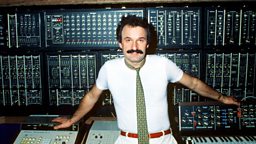
Producer of Donna Summer’s I Feel Love, Blondie’s Call Me & Berlin’s Take My Breath Away
‘The producer in music is almost like the director in a movie. You have to find the right song with the right lyrics, you have to have the right musicians to do it - then pick the singer. If the singer does all that then you have to arrange what the singer is doing. It's not just organising, it’s a creative job.
I have the advantage of being a producer and composer, so when I go in the studio I know the song in and out. Whenever possible I tell people, “sing it this way” or “change a little bit here”.
There are some cases where it's useless to tell them because they're so good, like David Bowie. I would never (have told) him “Sing it that way” or “Let's redo it” because it’s him. A lot of British singers are so good, like Freddie Mercury; it's almost a little intimidating and I just say, “do it the way you like it and it's okay with me!”‘
Nile Rodgers

Producer of Sister Sledge, David Bowie and Madonna
‘I have made records with everybody from a full symphony orchestras to Avicii and I believe that producers ultimately wind up at the same place, which is: they finish the project.
The mystery of turning an idea into an actual real composition... is the most thrilling adventure I could ever imagineNile Rodgers
My approach is relatively Old School. I am still the guy that wants to go in a room with charts for people that haven’t heard the song. They read it, they start playing it. That is my favourite scenario! I am most happy when I see the baby being birthed, if you will. It’s like – is it a boy or a girl? Oh my god, it’s twins! Oh no, it’s triplets … Let’s dance!
The greatest thing about being a producer is the art of collaboration and negotiation. I wish musicians were politicians - we get a hell of a lot of stuff done! My job is part creator, part psychologist, part brother and big friend.‘
Paul Epworth

Producer of Adele and Florence and the Machine
‘Being a producer is a mix of many different skill sets. It helps if you’re a musician, because you need to be able to hear what’s going on musically.
There needs to be something of a mad scientist about you to want to work in this environmentPaul Epworth
You have to fix problems; you have to have a technical understanding. It helps if you’ve got an understanding of being a DJ, of how songs work in clubs. It helps if you’ve got an encyclopaedic knowledge of music, because you’re able to understand people’s references if they’re after something.
It has helped me that I’m able to give people vocal coaching to help them find the right notes and get the right performance. And there needs to be something of a mad scientist about you to want to work in this environment.‘
Lamont Dozier

Producer of The Supremes and The Four Tops as part of the Holland-Dozier-Holland team
‘A producer’s job is to find opportunities for new sounds and new approaches to music. A producer has to be on top of everything that has to do with making music.
Just throw a hammer through a window and see what happens!Lamont Dozier
He has to be there to say, “let's bang on the piano, let‘s take a hammer and throw it through a piece of glass.”
When you don‘t have synthesizers, like we didn‘t have earlier, you create the sounds by going manual. Just throw a hammer through a window and see what happens! And then you just replace the glass later.
We were all kids trying stuff, and that‘s how it was done. Trial and error.‘
Foxes

Singer-songwriter whose debut album Glorious credits 8 different producers
‘When I’m working I find it hard to think outside of my own mind and I feel quite trapped in what I’m creating.
A producer sees what you can be and helps you create that. It’s like tying everything together.
If I didn’t have a producer that I worked very closely with I’d find it hard. It’s like a puzzle that needs piecing together and a producer helps you do that.‘
Tony Hoffer
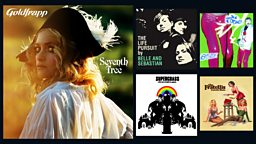
Producer of Beck, The Fratellis and Goldfrapp

‘When I'm producing something I'm trying to figure out how I can get somebody to listen to this song from beginning to end, multiple times and not change the channel on the radio.
And hopefully even buy the song and buy a ticket to see the band play.
It‘s using things like the structure of the song, the arrangement. Is it the right key for the singer‘s voice? Should the song be faster or slower?
Obviously you want to get cool sounds, whether it's real drums, programming, synths, piano.
But ultimately it all points to how can you get someone to listen to that song all the way through - and listen to it over and over again.‘
Trevor Horn
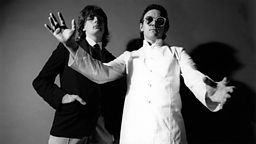
Producer of Frankie Goes to Hollywood and Seal
‘The simplest description of what a producer does is to finish the record.
I don't think you can really be a producer unless you had a hit record that you wrote yourselfTrevor Horn
Artists have got ideas but sometimes they can become discouraged or go round in circles. A producer is the person who should lead them through the experience and get them out the other end.
I don't think you can really be a producer unless you had a hit record that you wrote yourself. I think that should be your diploma, like a dentist has a diploma. It gives you the authority to say “I think this is wrong”.
Producers have a different sort of ego to artists. They tend to be quite unselfish because nobody really sees what you do and nobody really understands what you do but it is quite important.
It's quite a difficult job because you’re messing around with other people's music and sometimes they're really not going to like that... you have to be prepared to be unpopular at times.‘
Steve Levine

Producer of Culture Club, The Beach Boys and China Crisis
Nile Rodgers famously said he wanted to work with the worst group that Atlantic had, which was Sister SledgeSteve Levine
‘The role of a record producer is to be a visionary and to notice the things that no one else noticed, to find that thing in an artist that no one else spotted.
History is littered with artists who have failed with label X, Y or Z but when another producer's taken them on – bam!
Nile Rodgers famously said he wanted to work with the worst group that Atlantic had, which was Sister Sledge. Many artists, like Aretha Franklin, only became hugely successful when they worked with the right producer.‘
Nigel Godrich
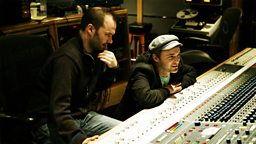
Producer of 7 albums for Radiohead
It's about mildly manipulating them into doing stuff they wouldn't normally doNigel Godrich
‘There’s a whole side to being a record producer which is about being a good shrink. It's about getting the best out of people and mildly manipulating them into doing stuff they wouldn't normally do.
What you have that the artist doesn't have is a brain outside of the thing, so you're like an editor and you can push things in directions that you know will work.
I'm absolutely sure about what things should be like, so the rest of it is about a little dance that you do and making things happen a certain way.‘
John Cale

Producer of The Stooges, Patti Smith and Happy Mondays
When you've been in the studio for 24 hours it's not necessarily the best time for doing calculated thingsJohn Cale
‘You have to be so many different things: a psychiatrist, a parent and a musician. Sometimes you could cover all of these topics without knowing anything about that.
Some things you can do with just pure enthusiasm for the task at hand and that's the best way. When you've been in the studio for 24 hours it's not necessarily the best time for doing calculated things.
It's the best thing when you can help somebody realise what they wanted to do, when they hop up and down and say “Yes!”. Then you know that maybe they'd been a little confused, but now you've got them.‘
BBC Arts exclusive bonus film
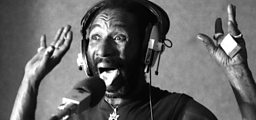
I Am Paint - Richard Russell and Lee "Scratch" Perry
There are 250 12" vinyl singles of I Am Paint by rLr.
The music is by Richard Russell, head of pioneering independent label XL Recordings, who has released music by The Prodigy, Adele, M.I.A. and Dizzee Rascal, and it features the spoken voice of legendary artist and producer Lee "Scratch" Perry.
The record features individually hand-painted sleeves by Russell & Perry, which they did over a whole night in Switzerland - with Russell flying in to see Lee Perry with a box of record sleeves and a crate of paint.
They want no money for the record - instead it's offered through a barter system. People are sent a copy in return for something they've made themselves.
Russell and Perry, in his own unique style, tell us about the I Am Paint concept and we see examples of the creations people are sending in to them - you can get involved too while stocks last.
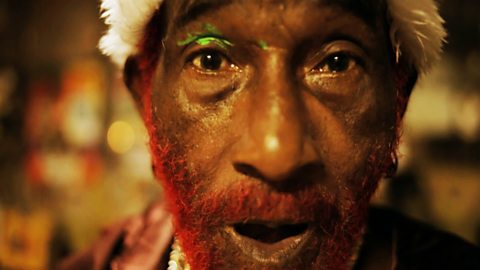
I Am Paint - Richard Russell and Lee "Scratch" Perry
A vinyl single, hand-painted by Russell & Perry, offered through bartering people's art...
Music Moguls | BBC Arts features
-
![]()
Exclusives collection
Exclusive films and features to accompany Music Moguls, the secret story of pop and rock from the greatest producers, managers and PR giants.
-
![]()
Svengalis & thugs
How rock's greatest managers take care of business. Plus extras featuring The Jesus & Mary Chain and The Who.
-
![]()
They're called Hitmakers...
But what the hell do music producers DO? Leading producers reveal all. Includes extras with Tony Visconti and Lee Perry.
-
![]()
5 ways to the top
Alan Edwards, PR guru and presenter of Music Moguls: Myth Makers, delivers his five point plan for pop stardom.
Music Moguls | BBC Four & BBC iPlayer
-
![]()
Money Makers
Part one looks at the maverick managers who controlled the careers of megastar artists. Watch now on BBC iPlayer.
-
![]()
Melody Makers
Part two looks at the producers, from Trevor Horn and Lamont Dozier to Tony Visconti. Watch now on BBC iPlayer.
-
![]()
Myth Makers
Part three looks at PR, the unseen force behind the biggest musical acts in the world. Watch now on BBC iPlayer.
More from BBC Arts
-
![]()
Picasso’s ex-factor
Who are the six women who shaped his life and work?
-
![]()
Quiz: Picasso or pixel?
Can you separate the AI fakes from genuine paintings by Pablo Picasso?
-
![]()
Frida: Fiery, fierce and passionate
The extraordinary life of Mexican artist Frida Kahlo, in her own words
-
![]()
Proms 2023: The best bits
From Yuja Wang to Northern Soul, handpicked stand-out moments from this year's Proms














